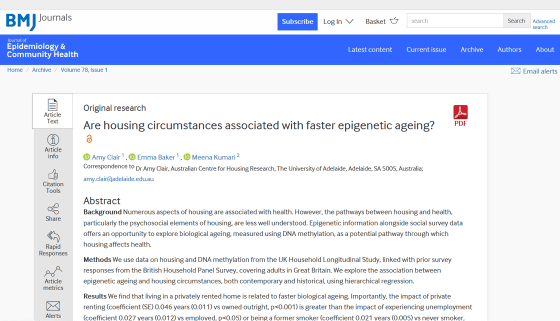Research shows that people living in rented homes experience biological aging faster than homeowners, and the negative effects are greater than unemployment and obesity.

Because it costs a lot of money to buy a home, in recent years more and more people are choosing to live in rental housing for the rest of their lives. However, a study conducted by a research team from Australia and the UK revealed that biological aging progresses faster in people who live in private rental housing than in people who own their own homes.
Are housing circumstances associated with faster epigenetic aging? | Journal of Epidemiology & Community Health

Living in privately rented homes linked to faster biological aging, study finds | Housing | The Guardian
https://www.theguardian.com/society/2023/oct/10/living-in-privately-rented-homes-linked-to-faster-biological-ageing-study-finds?CMP=Share_AndroidApp_Other
Insecure renting ages you faster than owning a home, unemployment or obesity. Better housing policy can change this
https://theconversation.com/insecure-renting-ages-you-faster-than-owning-a-home-unemployment-or-obesity-better-housing-policy-can-change-this-216364
Everyone's actual age increases by one year every year, but biological aging, which is calculated based on various data, differs depending on the individual's lifestyle and environment. Previous research has shown that depression , walking speed , and sleep patterns on weekends and weekdays are all associated with the speed of biological aging.
A research team from the University of Adelaide in Australia and the University of Essex in the UK analyzed the relationship between the speed of biological aging and the living environment based on data from 1,420 household heads collected in the British Household Longitudinal Survey . The biological aging marker used was DNA methylation , a chemical change in DNA that affects how genes are expressed and is considered a fundamental mechanism that accelerates human aging.
After controlling for income and lifestyle factors, we analyzed the relationship between living environment and biological aging, and found that people living in private rental housing lose an additional 2.4 weeks per year compared to those who own their own home. It turns out that aging is progressing. Living in private rented accommodation is more likely to cause biological problems than being unemployed (ageing 1.4 weeks per year), being obese (aging age 1 week per year), or being an ex-smoker (aging age 1.1 weeks per year) It is said that it has a great effect on aging.

In the United Kingdom and Australia, where this survey was conducted, rental contracts are relatively short, around one year, and in some states and regions it is possible to force eviction even if the tenant is not at fault. People living in rental housing are said to be more unstable. The researchers note that this housing instability may be related to biological aging.
In fact, people renting public housing, where housing tenure is more secure, showed no negative effects of renting on biological aging. This again suggests that it is not renting per se that is associated with biological aging, but rather the instability of privately rented housing.
The Guardian, a major British daily newspaper, says, ``In general, people living in private rental housing live in poorer conditions than other homeowners, with problems such as cold, damp, and deterioration.''According to the British Housing Survey. In 2021, 23% of privately rented homes do not meet
The finding that living in private rental housing is associated with accelerated biological aging is important in a country where an increasing number of people live in rented housing for the rest of their lives, unable to buy their own home due to cost and other issues. It has meaning.

Public discussions and messages about health typically focus on individual lifestyle habits such as smoking and obesity. However, increasing social housing and improving renter rights are areas where government policy changes can make a more direct difference.
The research team found that policies such as ``preventing no-fault tenants from being evicted,'' ``controlling rent increases,'' and ``improving the living environment of privately rented housing'' can affect the effects of rental housing on biological aging. It was argued that the impact could be reduced.
◆Forum now open
A forum related to this article has been set up on the GIGAZINE official Discord server . Anyone can write freely, so please feel free to comment! If you do not have a Discord account, please create one by referring to the article explaining how to create an account!
• Discord | 'Do you live in a rental house? Do you live in an owned house? Which one do you want to live in?' | GIGAZINE
https://discord.com/channels/1037961069903216680/1194571401282211890
Related Posts:
in Science, Posted by log1h_ik







